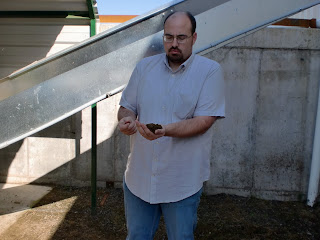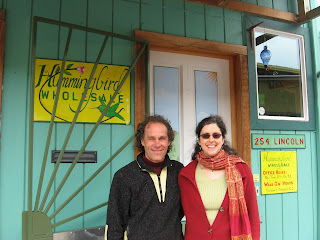This past week Kiva dairy buyer Emma and stalwart dairy stocker Roger got a chance to visit Alpenrose Dairy. The Kiva made the decision to switch to Alpenrose from Organic Valley because all of their milk is actually produced and processed here in Oregon. Now that we have visited their operation in person, we are that much more excited to be carrying Alpenrose organic milk in our store.
 |
| Roger and Emma, excited to be touring the Alpenrose facilities! |
Alpenrose was established in 1916 in Portland by the Cadonau family, and the company remains family run today. The organic milk processed and sold under the Alpenrose name comes from one of three Oregon farms. We visited Mayfield Farm; the other two are Ridgerock and Country Lane Farms. All three farms are owned by the Yeager family, and Chris Yeager was good enough to give us the tour of Mayfield Farm. The Yeagers have owned the Mayfield farm for 2 1/2 years and the dairy herd consists of 75% Holstein and 25% Jersey cows. A nine person crew runs the Mayfield farm. There are 400 cows at Mayfield, 300 at Rockridge Farm and 450 at Country Lane Farm. All the cows at the farms are certified organic and have been bred and raised on the farm. Oregon Tilth is the certifying agency for Alpenrose's organic certification.
The daily routine is the same at all three farms, so allow us to share with you the life of a Yeager dairy cow. The cows are milked first thing in the morning, then fed, bred (if it is the right time of the cycle for the individual cow) or pastured for at least eight hours to graze, then fed again before a final milking and bedtime.
All the cows receive at least eight hours of pasture time each day. They are bred when they are from 15-22 months, if they meet the weight requirement. Each cow is milked for 300 days a year and given 60 days off from milking. All three farms hold the title of "Animal Welfare Approved" which means that they are inspected and certified by the Animal Welfare Society. These are not factory farms.
The cows' supplemental feed consists of alfalfa, corn, barley meal, mineral supplements and protein meal (the protein meal is sourced from flax, canola or sunflower when available; soy is only used when the other three are not available, and even then the soy is non-GMO and grown in the U.S.). The corn is grown on the farm, and overall, 75% of the feed is grown in Oregon!
Of course, this feed is only supplemental. The 130 acres of the Mayfield farm are broken into 27 different grazing pastures. Each pasture is approximately five acres and the pastures are rotated when the cows have eaten the grass down to two inches. Because this area of the country is so rainy, the fields are equipped with drainage ditches to prevent the cows from standing around in muddy water which could lead to hoof rot or other problems. Look at these happy cows!
Calves:
The calves are kept together in groups of 10-15 per paddock because they are social animals. There is always fresh hay for the calves to lay in and a milking station where they can get milk. The calves are fed pasteurized milk to prevent any possible bacterial contamination. They are fed nothing but milk for the first four months of their lives. Each calf is tagged with a microchip, which tracks (among other things) how much milk the calf is consuming. The milk station is also equipped with a micro-chip which will cut off a greedy cow, ensuring that all the calves have equal access to the milk. The calves are weaned at four months and begin eating the regular feed and grazing in the pastures with the rest of the herd.
Most male calves are sold to other farms, but some of the ones with impressive pedigrees are kept to act as stud bulls on the farm.
Reduce, Reuse, Recycle... Manure?
One sometimes unwanted side effect of having a herd of cows is all the manure that piles up. At the Yeager farms, the manure is collected and the solids are separated from the liquid slurry. The solids go into a heated rotating drum, which sterilizes the solid matter and turns it into a safe crumbly material used on the farm as bedding for the cows and fertilizer for the feed crops. The liquid slurry is used on the farm as a fertilizer and any excess is sold for the same purpose. The Yeagers' were quite excited about reusing so much of the waste on site at the farm; in particular, not having to spend money to truck in straw bedding has been of great help.
 |
| Chris Yeager with a handful of of the dry, sterile material separated from the manure. |
Milking:
Two people oversee the milking operation. First, they check the cow's teats to make sure the milk has been let down and that there are no problems with the teats. The teats and instruments are cleaned and sterilized. If any problems are detected with a cow, they are not milked until approved by a veterinarian.
The milking equipment is checked every month by a certified inspector to ensure the pressure is correct so that the milking process is not painful for the cows. Safety of the cows is paramount, and every possible measure is taken to ensure that the milking process is as clean and comfortable as it can be.
When the milk comes out of the cow it is typically 80 degrees F, and then is cooled to 37 degrees to prevent any bacteria growth. The two tanks that hold the milk get cleaned every single day. Each tank can hold up to 8,000 gallons.
Each cow's milk production is tracked each day. Typically, a cow will produce between 30-60 pounds of milk per day, depending on age and stage in the breeding cycle. Cows usually produce slightly more milk in the morning milking than the evening, with approximately 55% coming from the morning milking and 45% from the evening. Tracking milk production is just one of many uses for microchip technology at the dairy.
Each cow wears a pedometer to monitor activity and other vital signs. The micro-chips in the pedometer and the ear tag allow for a surprising amount of information to be tracked for each individual cow. The herd managers keep really close tabs on the cows' activity levels and breeding cycles, to avoid over-milking a cow and shortening its productive lifespan. This kind of digital herd management has raised the average productive milking life-span of a cow on the this farm to seven years, about three years more than the typical dairy cow's productive life-span. Knowing when to avoid over-milking a cow, knowing exactly where in the breeding cycle a cow is, knowing exactly how much milk a cow has produced - these are the kinds of things that the micro-chip technology employed on the farm helps with.
Antibiotics?
A sick cow is immediately isolated from the herd and checked by a veterinarian. Natural remedies such as garlic, aloe vera and iodine are used whenever possible. If the cow's health and life is in danger, antibiotics will be used to help the cow, which is then sold to another farm.
Cows that have received antibiotics are NEVER reintroduced into the milking herd.
Processing the Milk
All the milk is taken to the Alpenrose processing plant which is only 20 miles down the road from the farm. This is truly remarkable in this day and age, and anyone concerned with the carbon footprint of shopping choices should take note that milk is typically trucked long distances from rural farms to processing plants. For instance, while family farmers in Oregon contribute milk to Organic Valley's "Northwest Pastures" line, their milk is trucked hundreds of miles to a processing plant in Seattle before being trucked back down to appear in Oregon stores. When you buy organic Alpenrose milk, you can rest assured that every step of the way your money is staying in the local economy, from the dairy farmer to the processor to the distributor (our Alpenrose milk is actually delivered to us by Lochmead, another wonderful local dairy that provides us with non-organic milk and delicious ice cream).
 |
| We were impressed with how spotlessly clean the processing plant was! |
The plant receives tankers of milk every day, and the milk is immediately taken to an on-site pasteurization machine for the pasteurization process. They pasteurize the milk at 165 degrees F, just slightly above the lowest legal temperature allowed of 161 degrees F, to ensure that as little of the nutritional value of the milk as possible is destroyed in the pasteurization process. All of the waste water produced by the plant goes into a filtering pond that cleans the water, before channelling it into the sewer. This prevents any leakage into the groundwater supply.
Alpenrose Community Spirit:
Alpenrose is extremely active in their community. They own and maintain three little league baseball fields on their property. They also host the girls Little League Softball World Series as seen on ESPN each year. There is also an Olympic-Regulation speed-bike track. There is even a Quarter Midget race track on the property! Alpenrose Dairy also hosts their Annual Easter Egg Hunt in which up to 6,000 kids and parents turn out to hunt for prizes. This hunt has been going on for 48 years now. Alpenrose sales and PR rep Tom Baker gave us a great tour and even dished us out fresh-made Alpenrose ice cream in the Dairyville Ice Cream Parlour!
Community picnics and social events are hosted on the manicured lawns, and "Dairyville" is a popular destination for birthday and holiday parties. Dairyville is a mock western town, complete with general store, opera house and an old time ice cream parlour! It is not open to the general public, but please call to inquire about specific events. Visit http://www.alpenrose.com/ to learn more about the wonderful activities that are hosted on the Alpenrose property.
 |
| Tom Baker scooping the ice cream in the Dairyville Ice Cream Parlour |






































